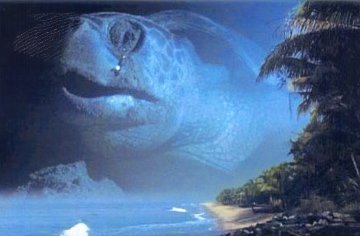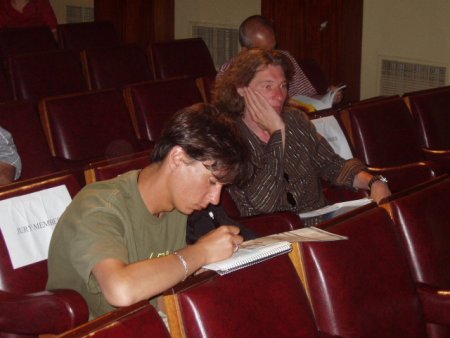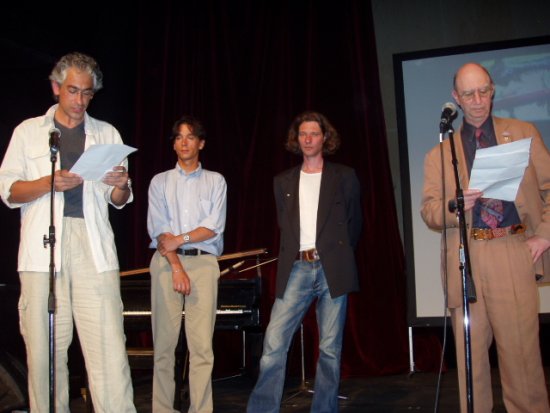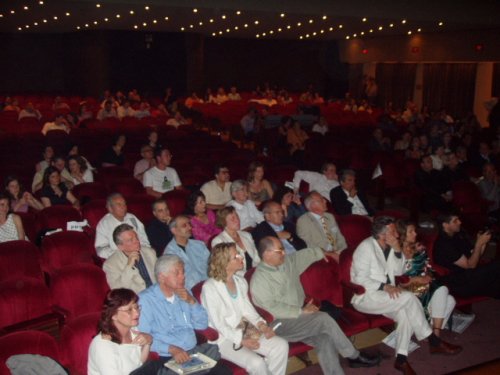Indian film wins first Ramsar/MedWet prize for wetlands- and water-related cinema, June 2004
Of Turtles and Men...
"The Turtle People" awarded at the 4th EcoCinema Festival
Aamakaar, the Turtle People was chosen Saturday night (5 June 2004) by the jury of the EcoCinema Festival as this year's best movie on wetlands and water. Surabhi Sharma's film was chosen by the jury because of its innovative focus on the inextricable link between people and nature, one of the main features of Ramsar's wise use principle.
 The jury also wanted to acknowledge the work of Surabhi Sharma, a young but promising film director who started her career in 1997 with the film "Work in progress". The particularly well-managed balance of Sharma's third film's images and soundtrack results in a high quality product, from both the ecological and the technical points of view -- halfway between a documentary and a feature film.
The jury also wanted to acknowledge the work of Surabhi Sharma, a young but promising film director who started her career in 1997 with the film "Work in progress". The particularly well-managed balance of Sharma's third film's images and soundtrack results in a high quality product, from both the ecological and the technical points of view -- halfway between a documentary and a feature film.
From the Ramsar Convention's perspective, Peter Bridgewater, Secretary General of the Convention, during the awards ceremony, highlighted the fact that "the film insists on the relation between people and nature, showing human activities and populations as an inextricable part of the environmental equilibrium. It also recounts a story about one of Ramsar's priority and yet most under-represented ecosystems: coastal and marine areas", though this additional factor was not part of the jury's decision. Spyros Kouvelis, Coordinator of Ramsar's MedWet Initiative for the implementation of the Convention in this region, also drew attention to "the particularly appropriate coincidence that we have selected a film on marine ecosystems precisely on the day we are celebrating the World Environment Day on the theme of seas and oceans".
Sharma's film shows the everyday life of the so-called Turtle People, in North Kerala (India), fighting for the survival of an Olive Ridley Turtle nesting beach while their own survival is threatened by the sinking of their village due to the erosion of the shore from sand mining activity in their estuary. The film juxtaposes the community's struggle against elements threatening their village and its natural resources with the cycle of life of the turtles. "This contradiction and the choices  made by this community give all its strength to the movie as well as a good lesson of philosophy and humanity", said Sebastià Semene, Special Assistant for Media, Outreach and Culture at the Ramsar Convention, and member of the jury. The Turtle People was chosen among the 92 films of the EcoCinema's 2004 selection. Originally included in the feature films section, Sharma's film attracted the attention of the Wetlands and Water jury "because of its professional quality and the use of original filming techniques, making this director a person to follow in the next few years", said Marc van Fucht, film producer and director, and member of the jury.
made by this community give all its strength to the movie as well as a good lesson of philosophy and humanity", said Sebastià Semene, Special Assistant for Media, Outreach and Culture at the Ramsar Convention, and member of the jury. The Turtle People was chosen among the 92 films of the EcoCinema's 2004 selection. Originally included in the feature films section, Sharma's film attracted the attention of the Wetlands and Water jury "because of its professional quality and the use of original filming techniques, making this director a person to follow in the next few years", said Marc van Fucht, film producer and director, and member of the jury.
The EcoCinema Ramsar/MedWet award for the best film on wetlands and water is intended to recognize top quality cinematic treatments of wetlands and water management and conservation-related issues in a positive way, to explain and raise awareness of the importance of these ecosystems and resources and of the solutions existing to solve real problems. Sharma's Turtle People received the Ramsar/MedWet award during the EcoCinema Awards Ceremony, 5 June 2004, in Rhodes, Greece, together with a prize of 4000€. It's the second award Sharma has received for this film, which was chosen as the third best film by the Indian Documentary Producer's Association in 2003. The movie will be screened in the main forthcoming Ramsar and MedWet events, in addition to its normal screening schedule. The Turtle People is distributed by Chrysalis Films.
For more information on the EcoCinema Festival: www.ecocinema.gr.
Aamakaar - The Turtle People
Surabhi Sharma
India, 2002 - 76 min.
 |  |

Jurors Sebastià Semene and Marc van Fucht

The awards ceremony: jurors Spyros Kouvelis, Sebastià Semene, and Marc van Fucht, and Secretary General Peter Bridgewater

-- reported by Sebastià Semene, Ramsar